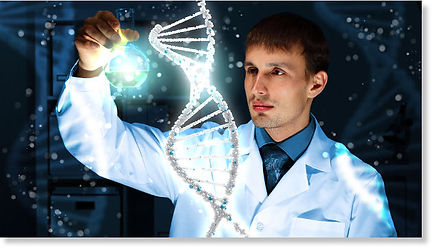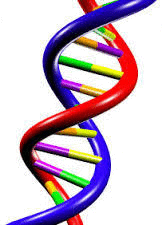Epigenetics At A Glance
There are studies being conducted on not only how epigenetic tags affect behavior, but how behavior can change epigenetic tags. Some highlights:
-
People who commit suicide have less-active ribosomal RNA (rRNA) genes than people who die of other causes. In people who commit suicide Methyl levels are higher on rRNA genes in a part of the brain called the hippocampus, which is important for learning and meory. More methyl means less rRNA production, which means fewer ribosomes, which means less protein production (12).
-
Child abuse is an enviormental factor that leaves an epigenetic mark on the brain. In a comparison of suicide victims who were abused or not, only those abused had an epigenetic tag on the GR gene. (12)
A word derived from Greek origin which means above and over the genome, epigenetics is simply the study of the genome. More specifically, this field focuses on gene activities and the modification of genes. Modifications in genes don't alter the genetic code of the genome but can be hereditary and even reversible. Epigenetic modifications include the addition of molecules, like methyl groups, to the DNA backbone. Adding these groups changes the appearance and structure of DNA, altering how a gene can interact with important transcribing molecules in the cell's nucleus (41) . A gene's expression can simply be turned on or off due to chemical additions, such as the methyl groups, to the genetic sequence, or also due to simple factors such as environmental conditions, diet, or lifestyle habits.

Imagine..a world free of genetic abnormalities...
This world could one day be ours. But how? Through the field of epigenetics, scientists one day hope that something as simple as turning off an undesired gene or manipulating the gene itself could be the breakthrough in the defeat of numerous diseases and disorders, including Alzehemier's, cancer, and angelman syndrome
For the longest time, one of the the biggest and greatest psychological debates has been between nature vs. nurture: whether its genetic inheritance or environmental factors that account for a person's traits and characteristics. Although it's still a debate, the field of epigenetics has proposed that it isn't just a case of nurture or nature. A person's development, or any organism really, is based on both nurture and nature. DNA is what decides certain permanent traits such as eye color, while the environment is what shapes other traits, such as how a person would respond to a stressful situation. In 2004, McGill University reported that maternal nurturing behavior can affect the epigenotype based on their studies. They discovered that mother rats who often licked their pups during the first week of life raised calm pups; the mother rats who licked their pups less often or not at all raised more anxious pups. As adults, the female pups, when mothers, copied their mother's behavior towards their own pups due to their epigenetic programming (42).
What Exactly is Epigenetics?
The Ultimate Question: Is It Nature or Nurture?
Welcome to the World of Epigenetics
A brief video explaining the basics of epigenetics; how the outside world that affects our body also affects our genome.


Number of people in your family who will be affected by cancer in their lifetimes: 1 in 2 men, 1 in 3 women
Amount of money it takes to launch a star to honor someone you love: $1
Percentage of SU2C public donations received that go directly to support groundbreaking cancer research: 100%
The thing it's never too soon to do: Stand Up and Give.
Get Involved!
Some Epigenetic Disorders
Fragile X-Syndrome
Rett Syndrome
Angelman's Syndrome
Prader-Willi Syndrome
BWS
Leukemia
Coffin Lowry Syndrome
ICF Syndrome
DID YOU KNOW THAT...
TWINS
INNOVATORS
Keep up with the latest news on epigenetics here!








